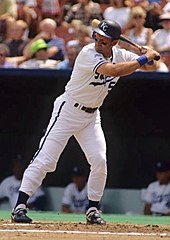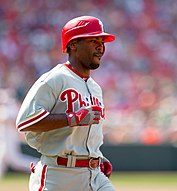In Major League Baseball (MLB), the 20–20–20 club is the group of batters who have collected 20 doubles, 20 triples and 20 home runs in a single season. [1] [2] [3] Frank Schulte was the first to achieve this, doing so in 1911. The last players to reach the milestone – Curtis Granderson and Jimmy Rollins – attained 20–20–20 during the 2007 season. [4] This marked the first time that two players accomplished the achievement in the same season. [5]
In total, seven players are members of the 20–20–20 club. [6] Of these, five were left-handed batters, one was right-handed and one was a switch hitter, meaning he could bat from either side of the plate. Two players – George Brett and Willie Mays – are also members of the 3,000 hit club, [7] and Mays is also a member of the 500 home run club. [8] Schulte, Rollins, and Jim Bottomley won the Most Valuable Player (MVP) Award in the same year as their 20–20–20 season. [9] [10] [11] Both Mays and Rollins joined the club while also hitting 30 home runs and stealing 30 bases that same season to join the 30–30 club. [12] [13] [14] Brett and Rollins collected more than 200 hits alongside achieving 20–20–20. [9] [15] Furthermore, four players amassed 20 or more stolen bases during their 20–20–20 season. These players are collectively referred to as the 20–20–20–20 club. [16] [17] [18]
Historically, there have been numerous players who have hit 20 doubles and 20 home runs in a year. It is the component of triples, however, that makes the 20–20–20 club so difficult to achieve. This is because hitting triples often comes under a similar hit placement as doubles, but may require impressive speed on the part of the runner. [19] This would pose a challenge for both a slugger, who may be slower at running the bases and have the tendency to hit line drives and fly balls out of the park for a home run, [20] [21] as well as a speedster, who may be more swift around the bases but may not supply much power to drive the ball far. [21]
Due to the rare occurrence and low membership of the 20–20–20 club, Baseball Digest called it "the most exclusive club in the Majors" in 1979, [22] when there were only four members. Of the five members eligible for the Baseball Hall of Fame, three have been elected and two were elected on the first ballot. [23] Players are eligible for the Hall of Fame if they have played in at least 10 MLB seasons, and have either been retired for five seasons or deceased for at least six months. [24] These requirements leave 2 players ineligible who are living and have played in the past five seasons.
Members


| Year | The year the player's 20–20–20 season occurred |
|---|---|
| Player | Name of the player |
| Team | The player's team for his 20–20–20 season |
| 2B | Number of doubles in that year |
| 3B | Number of triples in that year |
| HR | Number of home runs in that year |
| SB | Number of stolen bases in that year |
| † | Elected to the Baseball Hall of Fame |
| Year | Player | Team | 2B | 3B | HR | Ref |
|---|---|---|---|---|---|---|
| 1911 | Frank Schulte | Chicago Cubs | 30 | 21 | 21 | [10] |
| 1928 | Jim Bottomley† | St. Louis Cardinals | 42 | 20 | 31 | [11] |
| 1941 | Jeff Heath | Cleveland Indians | 32 | 20 | 24 | [25] |
| 1957 | Willie Mays† | New York Giants | 26 | 20 | 35 | [26] |
| 1979 | George Brett† | Kansas City Royals | 42 | 20 | 23 | [15] |
| 2007 | Curtis Granderson | Detroit Tigers | 38 | 23 | 23 | [27] |
| 2007 | Jimmy Rollins | Philadelphia Phillies | 38 | 20 | 30 | [9] |
20–20–20–20 club
| Year | Player | Team | 2B | 3B | HR | SB | Ref |
|---|---|---|---|---|---|---|---|
| 1911 | Frank Schulte | Chicago Cubs | 30 | 21 | 21 | 23 | [10] |
| 1957 | Willie Mays† | New York Giants | 26 | 20 | 35 | 38 | [26] |
| 2007 | Curtis Granderson | Detroit Tigers | 38 | 23 | 23 | 26 | [27] |
| 2007 | Jimmy Rollins | Philadelphia Phillies | 38 | 20 | 30 | 41 | [9] |
See also
- 40–40 club, similar multiple stat club for home runs and stolen bases.
- Baseball statistics
- Triple Crown
References
-
^
"Statistics". Baseball Digest. 49 (5). Evanston, Illinois: Century Publishing: 8. May 1990.
ISSN
0005-609X. Retrieved July 6, 2012.
How many players have had 20 or more doubles, triples, and home rune in the same season? ... To further narrow the 20–20–20 club, has anybody else, besides Mays added 20 stolen bases ...
-
^ Koppett, Leonard (July 9, 1990).
"At Second, He's First In the Class". The New York Times. Retrieved August 9, 2012.
The first year, I almost made the 20-20-20 club: I had 19 triples and 19 homers, and more than 20 stolen bases.
-
^
"Granderson joins elite homer-double-triple club, helping Tigers beat Seattle". USA Today. Associated Press. September 7, 2007. Retrieved August 11, 2012.
Granderson [was] just the sixth player since 1900 with at least 20 home runs, 20 doubles and 20 triples in one season..., join[ing] the 20-20-20 club.
- ^ Harrigan, Thomas (March 15, 2020). "No player has joined this exclusive club since '07". MLB.com. MLB Advanced Media. Archived from the original on April 19, 2020. Retrieved May 24, 2020.
- ^ Nemec, David (March 5, 2019). Incredible Baseball Trivia: More Than 200 Hardball Questions for the Thinking Fan. Simon and Schuster. p. 138. ISBN 9781683582342.
-
^
"Granderson's 20th steal puts Tigers center fielder in select company". ESPN. ESPN Internet Ventures. Associated Press. September 9, 2007. Retrieved December 8, 2010.
Granderson has 22 triples—the most by a Tiger since Ty Cobb had 24 in 1917—and 36 doubles. He hit his 20th homer Friday, becoming the sixth player since 1900 in the 20-20-20 club and the first since Kansas City's George Brett in 1979.
- ^ "Career Leaders & Records for Hits". Baseball-Reference.com. Sports Reference. Retrieved May 8, 2012.
- ^ "Career Leaders & Records for Home Runs". Baseball-Reference.com. Sports Reference. Retrieved May 8, 2012.
- ^ a b c d "Jimmy Rollins Statistics and History". Baseball-Reference.com. Sports Reference. Retrieved May 8, 2012.
- ^ a b c "Frank Schulte Statistics and History". Baseball-Reference.com. Sports Reference. Retrieved May 8, 2012.
- ^ a b "Jim Bottomley Statistics and History". Baseball-Reference.com. Sports Reference. Retrieved May 8, 2012.
-
^ Dorfman, John (April 17, 2011).
"His 30–30 club has 5 stocks as stars". Omaha.com (Bloomberg News). Archived from
the original on January 31, 2013. Retrieved June 24, 2012.
In baseball, the club is for ballplayers who belt 30 home runs and steal 30 bases in the same season.
-
^ Deane, Bill (May 1987).
"Here Are Top Candidates To Join Elite '30-30' Club". Baseball Digest. 46 (5). Evanston, Illinois: Century Publishing: 34.
ISSN
0005-609X. Retrieved July 6, 2012.
In 1956, Willie Mays became the second player to score a 30-30 season; a year later, he became the first to turn the trick twice.
- ^ Jasner, Andy (September 25, 2007). "Rollins joins 30-30 club for first time". MLB.com. MLB Advanced Media. Retrieved June 24, 2012.
- ^ a b "George Brett Statistics and History". Baseball-Reference.com. Sports Reference. Retrieved May 8, 2012.
-
^ Associated Press (September 30, 2007).
"Baseball: Rollins joins 20-20-20-20 club". Honolulu Advertiser. Archived from
the original on September 13, 2020. Retrieved December 8, 2010.
Phillies star Jimmy Rollins tripled against Washington on today and joined Curtis Granderson, Willie Mays and Frank "Wildfire" Schulte as the only players in major league history with 20 stolen bases, 20 homers, 20 triples and 20 doubles.
- ^ Kirby, Tim (September 9, 2007). "Granderson steals way to elite class". MLB.com. MLB Advanced Media. Archived from the original on March 3, 2016. Retrieved June 16, 2012.
-
^
"Tigers lock up outfielder Granderson with five-year, $30.25M deal". ESPN. ESPN Internet Ventures. February 4, 2008. Retrieved June 16, 2012.
He joined Willie Mays and Frank "Wildfire" Schulte as the only players in major league history with 20 steals, 20 homers, 20 triples and 20 doubles. Philadelphia shortstop Jimmy Rollins became a part of the 20-20-20-20 club later in the season.
- ^ Koney, Jackie; Silva, Deidre (2008). It Takes More Than Balls: The Savvy Girls' Guide to Understanding and Enjoying Baseball. Skyhorse Publishing. pp. 66–67. ISBN 978-1-60239-631-9. Retrieved September 23, 2011.
- ^ Grant, Evan (July 16, 2010). "Bengie Molina on cycle: 'Being slow has never been a joke for me'". Dallas Morning News. Archived from the original on January 30, 2012. Retrieved June 23, 2012.
- ^
a
b DiComo, Anthony (June 20, 2011).
"Reyes turning the triple into an art form". MLB.com. MLB Advanced Media. Retrieved June 23, 2012.
Citi Field['s] high walls and quirky outfield dimensions...has certainly played a role in the frequency of Reyes' triples, not only allowing a greater percentage of them to fall safely on the outfield grass, but also ensuring that only a few of his line drives will clear the fence for homers.
[ permanent dead link]
The only thing a hitter can control...is his baserunning effort -
^ Wertz, Dennis M. (October 1979).
"The Most Exclusive Club in the Majors: Since 1900, only four players have collected 20 doubles, triples, and homers in one season". Baseball Digest. 38 (10). Evanston, Illinois: Century Publishing: 60–61.
ISSN
0005-609X. Retrieved July 6, 2012.
It may sound like an eye test for a three-eyed monster in a sci-fi movie, but the combination of 20-20-20 is the criterion for membership in one of baseball's most exclusive clubs.
- ^ "Baseball Hall of Fame Inductees". Baseball-Reference.com. Sports Reference LLC. Retrieved November 7, 2016.
- ^ "Rules for Election". National Baseball Hall of Fame and Museum. Retrieved October 8, 2016.
- ^ "Jeff Heath Statistics and History". Baseball-Reference.com. Sports Reference. Retrieved May 8, 2012.
- ^ a b "Willie Mays Statistics and History". Baseball-Reference.com. Sports Reference. Retrieved May 8, 2012.
- ^ a b "Curtis Granderson Statistics and History". Baseball-Reference.com. Sports Reference. Retrieved May 8, 2012.

